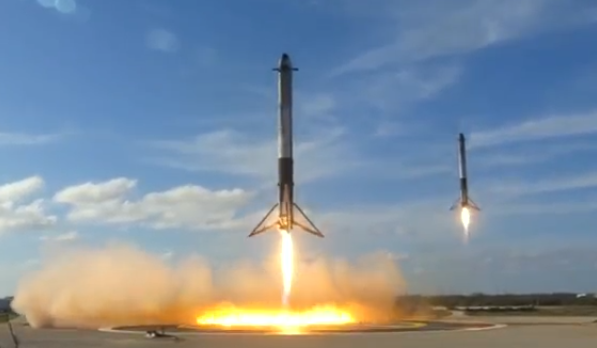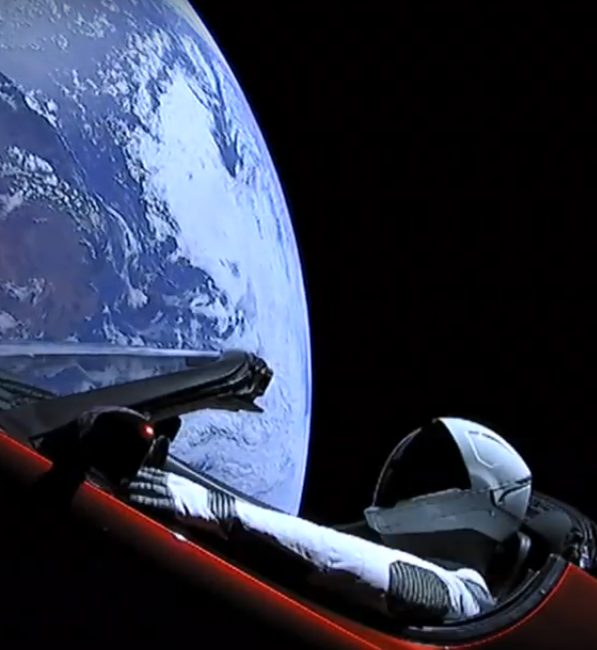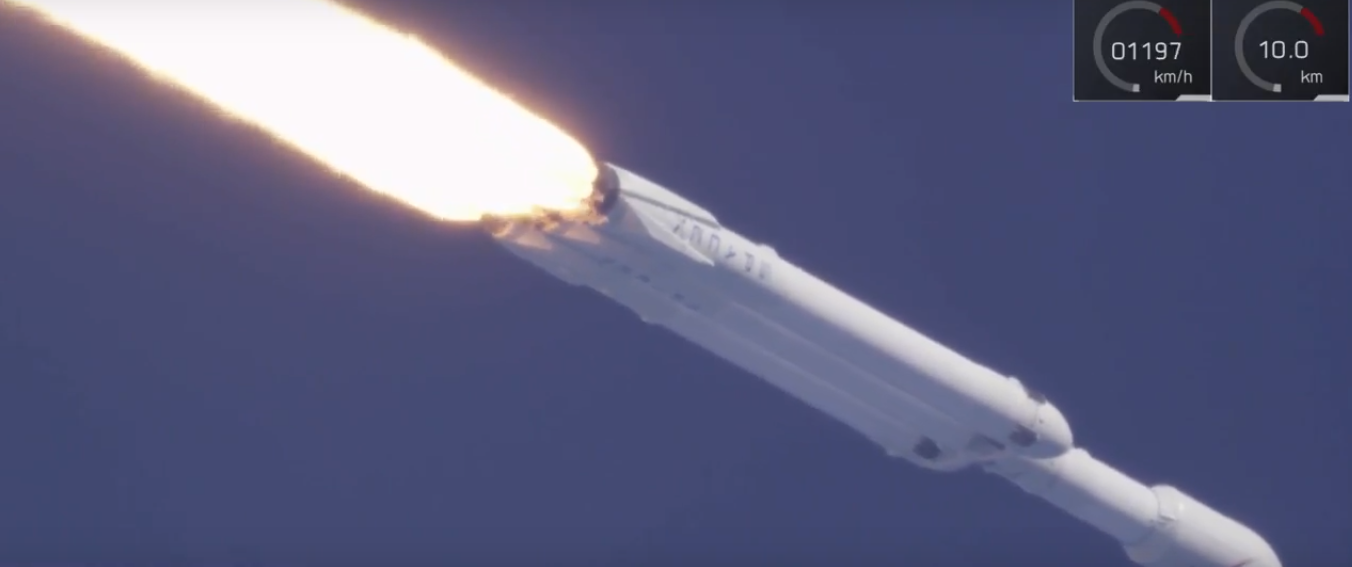
And this one is a transparent piece of showmanship but will probably become a classic (from the livestream, watch Earth drifting away, I wonder how long the link lasts?):

And I liked this:

I suppose it's rocket engineering, really.
Refs
* Overhype much?- from ATTP about "planets in nearby galaxy" that I'd rather wondered about, but not found time to read the details.
* Back on the GW wars beat, Weirdness from Armstrong/Green and conservative media from Moyhu.
* Or, join the Graun in whinging.
* They whinge more! But Timmy points out why they are wrong. Or, since they're so badly wrong, he points out some of the reasons they are wrong. And, as he doesn't say, the problem in Syria is govt.
* China and Europe love SpaceX’s new Falcon Heavy rocket. Does NASA?
* China Has Mixed Feelings About Elon Musk’s Falcon Heavy Success.
* whereisroadster.com
36 comments:
Well that was really great. Seriously GREAT!!!
Now, I wonder what will happen to all those southern state (Texas, Louisiana, Mississippi, Alabama and Florida) government's federal NASA assets? They are all mostly deep red states. I say, Kill the SLS. Time to trim the southern fat from NASA.
Will Bezos get the federal government's next rocket engine contract? I hope so.
There was a time and a place for American federal government rocketeers, it was called the 1960's.
Spacex are always very careful to say thank-you to NASA etc during flights, but that may be more a need to keep on their good side than reality. As to SLS, it seems hard to see how it can survive, even given the mighty pork-generating machine that is the US govt.
Star treking across the universe,
only going forward cos we can't find reverse.
They absolutely positively have to lunch one of these things as the finale of the Apollo 11 50th anniversary party at Canaveral -- I had quite despaired of ever again hearing anything as loud as a Saturn V, but the Falcon Heavy occupies the same place of honor on the Richter scale.
FWIW, SpaceX would never have got to where it is without NASA contracts and other funding.
I think that's true, but it is "true but". One of the buts is compare it to the pork that's been poured onto the SLS. Another is that it would be better to be able to say they got something from NASA beyond funding. Coming to what I really mean, it's obvious (now) that the NASA rocket program has gone badly wrong for decades.
I'm not sure what you mean. What ought they have got from NASA besides funding? (Oh, and all sorts of fundamental science and engineering research and expertise etc etc).
Agreed that SpaceX is making NASA look bad (along with all other rocket programs in the world, both public and private).
(Completely agree about SLS which is classic military-industrial-complex pork of the first water).
> all sorts of fundamental science and engineering research and expertise
Yes, exactly.
There is a long tradition of government/ commercial overlap.
Consider aviation. The first aircraft were built by individuals.
During WW1 aircraft performance improved dramatically, research financed by government contracts. After WW1 the same technology was used for airliners.
During WW2 the government financed and carried out research into high speed flight and jet engines,from which jet airliners later emerged.
Now the NASA research that produced Apollo and the Shuttle is helping Blue Origin and SpaceX.
Keith Spencer @ Salon excoriates Musk and with good reason.
David -
The Tesla was a dummy payload in all but name. You don't put live payloads on the first launch of a new rocket system, because they have a long history of failure.
I personally hope that something comes of a plan for a permanent base on the moon. If we can come up with a base that is not zero-sum - i.e. that can make basic materials out of lunar rocks - then things like a Mars mission become a lot easier. For example, you should be able to make elemental oxygen, aluminium. magnesium, and iron from lunar basalt fairly simply (using solar power, presumably), and hopefully enough volatiles would be present to get water, which means fuel. Such a moon base would make all other things space-related much cheaper, because you wouldn't have to haul as much stuff up.
You fail to understand the objection.
Evidently. How would you explain it, then?
To me that article seems like:
Musk flys car to space and says "fun things are important"
Serious scientist replies 'They could have done something useful, and to do something fun is a slap in the face to serious science, and that's obnoxious to serious science'.
To me this seems weird:
Firstly, it is SpaceX (and Musk as CEO) prerogative to decide what to do. SpaceX is paying for the launch, so it is their right to choose what to do whether that is sending a lump of concrete, or finding some cheap cubesats that are easily and cheaply replicated if something goes wrong, or something fun. I have no idea how easily these could be found and how much SpaceX might have been paid for launching on a risky maiden launch, but it is SpaceX's right to choose and attempting to usurp that right does not seem appropriate.
Secondly, Musk is an engineer, if he wants to send something fun to inspire young people to get into engineering, that seems a sensible thing to do compared with sending a lump of concrete.
Thirdly by complaining about it, it seems to say if you become a scientist, you will become old and bitter and complain that something that is inspiring to potential engineers is bad because it isn't inspiring scientists. So raising such a complaints seems counterproductive and is just moaning for no good reason.
That is my reaction, but no doubt other people will see things differently. No idea what David Benson thinks is 'good reason'.
Failed to sterilize before launch. Which you would have known had you read the opinion piece.
Well, we don't know if it was sterilized or not, but it's not exactly a high-risk scenario. Bacteria would have to survive a vacuum and radiation-exposed car for a long period of time, the car would have to actually hit something (space is big, hitting things is hard even if you are doing it deliberately, try playing KSP), organisms would have to survive a hard impact with Mars and then survive in what we know is a strongly oxidizing environment.
Not something you'd bet on. Now, it's far more likely for rock fragments blasted off by impacts to transfer bacteria across, because, among other reasons, the species of bacteria transferred would be those that could survive inside rocks. Whereas those on a Tesla would have some from human and animal sources, being unsuited for survival on mars. So if such transfers are possible, odds are that they have already happened, making any question of contamination moot.
It does seem like motivated nit-picking. And having a go at Musk at a time when most billionaire oligarchs are spending their cash on luxury yachts, private jets, show houses and other stuff that advances nothing seems a bit misplaced to me.
David, none of the anti-shergottites lying around on Mars were sterilized either.
Inside the solar system, interplanetary impact-launched mass transfer is pretty much a Known Known.
http://www.bbc.co.uk/news/science-environment-43063379
They calculated that the roadster has a 6% chance of colliding with Earth and a 2.5% probability of hitting Venus over the next million years.
The team's computer simulations suggest there is a very slim chance of the vehicle colliding with the Sun, but little to no chance of the car hitting Mars.
...
Dr Rein also allayed any fears, however unlikely, that a collision with Mars could contaminate the Red Planet with terrestrial bacteria, complicating scientific efforts to detect any indigenous microbes. "This thing will be in space for several million years before it hits anything," he told me.
Couldn't have known that at launch. Furthermore, it was aimed @ Mars.
DB: I think answers like "You fail to understand the objection" are pointlessly gnomic. Why not just say what you mean? Indeed, why not say it with the initial comment?
But your objection makes no sense on it's own terms: as the article says "sending a luxury car into space, to orbit the sun for eternity. Long after Tesla stock collapses, long after SpaceX is nationalized out of existence, long after the “Zuckerberg” in Zuckerberg San Francisco General Hospital is displaced by another trillionaire donor’s name, the Tesla will keep on circling the sun". So the sterilisation point is irrelevant.
The article is also profoundly stupid in other ways. "Why not send a whole fleet of CubeSats [small cubical satellites] or something?" Well, we all know the answer to that: risking a pile of expensive satellites on something that had a high probability of blowing up on the launch pad would not have been sensible.
But you know full well that the people writing the article already know that. So by failing to put in that obvious answer, the article is also dishonest.
And finally... I'm not really convinced the sterilisation stuff actually makes any kind of sense. See-also RS.
>"Furthermore, it was aimed @ Mars."
No, it was aimed at reaching approx mars orbital distance at aphelion and at not quite the same inclination to the ecliptic.
"The closest approach to the red planet Mars in the next orbit will occur on June 9 2018 when it will be approximately 0.740 AU away."
4.3 million miles in Oct 2020 is a good bit closer.
Knowing the current position and velocity may have altered the odds a little from what was expected prior to launch, and there may well have been a lot of uncertainty resulting in something a good bit different than the 4.3 million miles in a short period of time but as it is on a different inclination it wouldn't hit but could possibly be disturbed onto a very different orbit when it might then have a very very low chance of hitting Mars. Was this known at launch, yes I think so.
So my question is, what will Bezos launch?
I'm guessing a cash register.
Or moneybags ....
Bezos / Blue Origin are looking well behind the curve at this point. FH could pretty well have launched their booster as payload.
William, see https://www.technologyreview.com/s/609974/how-nuclear-weapons-research-revealed-new-climate-threats/. Lots of interest, but note especially the sea ice modeling claims.
JPL sterilizes all the deep space stuff ever since it was discovered that a bacterium or several survived a round trip to the surface of Luna. Well, inside the Hasselblad so within 1.3 meters of the surface.
Discovery of Terrean life forms elsewhere in the solar system would be momentous provided such was not inadvertently introduced by carelessness. RS also misses the point.
P.S. I have only limited posting abilities from this mobile device. Others can search more easily than I can copy a link, or text.
Given the current orbit is considerably different than the plan you describe, sterilization would have been advisable. Fortunately no harm seems to have been done.
> sterilizes all the deep space stuff ever since
You say it as though it were admirable, but I'm not sure it is. It is also consistent with a sclerotic bureaucracy that values rules and process above all else. And not even that; recall the shuttle disasters.
He says it as if it is required rather than admirable. I might be prepared to concede that it would have been preferable to be sterilised if he is prepared to concede it was a very low risk and, within a short period of time, an even lower risk.
But in what way is "the current orbit is considerably different than the plan [I] describe"?
Perihelion 0.98614 au
Aphelion 1.6639 au
Inclination 1.078°
Mars Inclination 1.85°
Mars Aphelion 1.666 AU
Inclination slightly different? check,
Mars orbital distance? check
Seems plan and what happened were pretty much exactly as I described.
I was under the impression that the roadster is going out into the asteroid belt, rather far beyond Mars orbit.
Yes, the lack of sterilization was very low risk. But the experience has been such that all risks need to be absolutely minimized. When done, JPL has some fabulous successes.
The shuttle was not a JPL project.
Actually having deep space stuff work requires careful planning as one cannot send a repairman. I offer the informed opinion that JPL manages, mostly, do their engineering properly.
To hopefully conclude this exchange, I am pleased that the Musk heavy lifter did so well on first launch. It demonstrates some maturity in space engineering which has taken at least since my youth,when a V2 passed far overhead launched from the White Sands Proving Grounds, attempting a near orbital flight, crashing into the Arctic Ocean.
https://www.space.com/39652-starman-not-going-to-asteroid-belt.html
You seem to be contradicting your own point about NASA. Maybe you could spell it out? They are indebted to NASA both for funding and for the fundamental research etc, and they acknowledge that.
It is *false* that all deep space stuff is sterilized. That's why, for instance, Cassini was disposed of in Saturn: because it wasn't sterilized and they didn't want to leave it lying around in a circum-Saturn orbit where sooner or later it would be swept up by a moon, possibly a watery moon. Missions intended for planetary (or cometary) surfaces are sterilized.
The original plan for the Roadster was an orbit having the appropriate parameters for MTO (Mars Transfer Orbit), but not to actually intercept Mars because the timing is completely wrong, but then SpaceX decided they wanted to run the upper stage to exhaustion, because they were particularly interested in upper stage performance after coasting for several hours through the Van Allen belts and an on-orbit relight. So they didn't know exactly what the final orbit would look like.
http://www.sciencemag.org/news/2018/02/nasa-planetary-protection-officer-suggests-loosening-limits-exploring-mars-life
Interesting; it may be that the end of the era is in sight.
Post a Comment